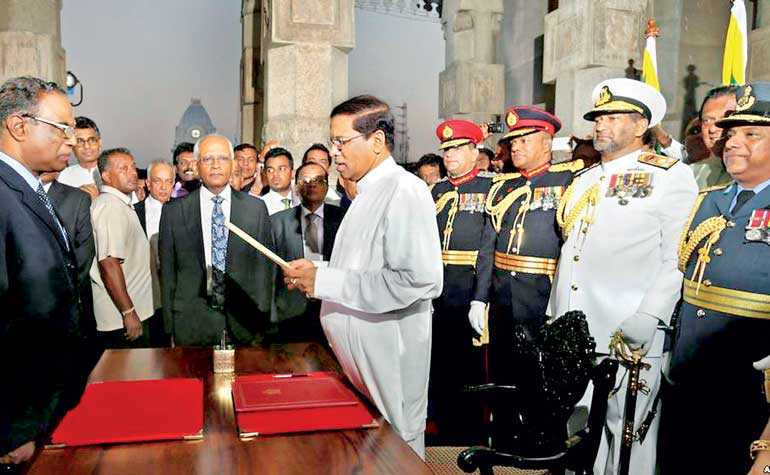Sunday Feb 22, 2026
Sunday Feb 22, 2026
Tuesday, 5 June 2018 00:00 - - {{hitsCtrl.values.hits}}

It is ironical that the movers of the Constitutional Amendment themselves had to seek further clarifications from the courts
regarding their own creation! The issue was the uncertainty about the term of office of the incumbent President after the 19A
Constitutional matters are in general beyond the perception of laymen. Very often clarifications are sought on many related issues. Sometimes what is presumed to be the true position is far from being so. Because legal interpretations indicate different significations.
Certain issues arising out of the 19th Amendment of the Constitution of Sri Lanka, focused recently, could be cited as a case in point. In this instance the intervention of the Supreme Court had to be sought to obtain a clarification about the term of office of the incumbent President.
It is ironical that the movers of the Constitutional Amendment themselves had to seek further clarifications from the courts regarding their own creation! The issue was the uncertainty about the term of office of the incumbent President after the 19A. According to the legal representations and arguments placed it was determined that the term of office of the President is five years and not six years as it was presupposed. 
Now to the common man this poses a big question as to how the term of the President they elected for a period of six years got reduced to five years. They seem to feel, thinking ordinarily, that there was a constitution in force when they exercised their universal franchise guaranteeing inter alia, “in the Republic of Sri Lanka sovereignty is in the people and is inalienable. Sovereignty includes the powers of Government, fundamental rights and the franchise.”
They also tend to rely on constitutional provisions such as “the fundamental rights which are by the constitution declared and recognised shall be respected, secured and advanced by all the organs of the government, and shall not be abridged, restricted or denied, save in the manner and to the extent hereinafter provided; and the franchise shall be exercisable at the election of the president of the republic…”
When the last presidential election was held the Constitutional Provision 30 (2) that was in force which read as, “The President of the Republic shall be elected by the people and shall hold office for a term of six years.”
Accordingly there was no doubt or ambiguity about the term of office of the President in the minds of the people who elected him. However to the extreme surprise of the Public it is now known that the term of office of the President they elected for six years is now reduced to five years under the 19th Amendment of the Constitution. It is reported that this has happened due to a special provision in the 19 A under Section 49 sub titled ‘transitional provisions’ stated as follows;
“the persons holding office respectively, as the President and Prime Minister on the day preceding April 22, 2015 shall continue to hold such office to the provisions of the constitution as amended by this Act;…”
If not for this transitional provision the President who was elected by the people for a term of six years would have continued for the full term. The big question that arises in the minds of laymen is whether this deferment of the term to five years is not overriding the sovereignty of the voters. If this matter was referred to a Referendum to be decided by the People there could not be any doubts. Whatever the legal interpretation is the people of the country expected the President whom they elected to serve the country for a full term of six years according to the constitutional provisions in force then.
Article 30 of the constitution has been replaced by a new article which reads as follows;
30 (2) new Section 3 of the 19th Amendment;
“The President of the Republic shall be elected by the People and shall hold office for a term of five years.”
When this provision was adopted under the amended constitution there was a President already serving a term elected previously. Does it not convey a meaning that the provision refers and apply to future elections? Since the word shall is futuristic!
Chapter viii of the Constitution has been completely replaced by a new Chapter viii. (The Executive)
Under this Constitutional Amendment the following are observed which cause some confusion in the minds of the people.
According to Article 42(4) The President shall appoint as Prime Minister the MP, who, in the President’s opinion, is most likely to command the confidence of Parliament.
Article 43(1) states, The President shall… determine the number of Ministers of the Cabinet of Ministers and the Ministries and the assignment of subjects and functions to such Ministers (in consultation with the PM, where he considers such consultation to be necessary). Hence the prerogative appears to be with the President alone.
Under Article 43(2), The President shall on the advice of the Prime Minister, appoint from among Members of Parliament, Ministers to be in charge of the Ministries so determined (underlined section is a new addition).
Article 43(3) provides that, The President may at any time change the assignment of subjects and functions and the composition of the Cabinet of Ministers.
According to Article 46(2), The Prime Minister shall continue to hold office throughout the period during which the Cabinet of Ministers continues to function under the provisions of the constitution unless he:
a) Resigns his office under his hand addressed to the President or
b) Ceases to be a MP
This indicates that if the Cabinet of Ministers cease to exist at any moment the Post of Prime Minister will not be there. In other words for the Prime Minister to exist there should be a Cabinet.
Article 48(1), describes the circumstances under which the PM will cease to hold office.
“On the Prime Minister ceasing to hold office by,
nDeath
nResignation or
nOtherwise
Except during the period intervening between the dissolution of Parliament and the conclusion of the General Election, the Cabinet of Ministers shall, unless the President has in the exercise of his powers under Article 70, dissolved Parliament, stand dissolved and the President shall appoint a Prime Minister and Ministers of the Cabinet.
According to this provision the Cabinet of Ministers stands dissolved automatically if the PM ceases to hold office.
While this is how it appears in the English translation copy, the original Sinhala version gives an entirely different version.
It says the Prime Minister ceases to hold office by
nRemoval from position
nResignation or
nOtherwise
The removal part is not there in the English translation.
But according to the law the Sinhala text shall prevail in the event of any inconsistency.
It therefore follows that the Prime Minister is vulnerable to be removed from his position. It is clear that such a step can only be taken by the person who appoints him. Hence the argument that the President cannot remove the PM is not valid.
On the other hand if the President gives effect to Article 43(3) and changes the composition and the assignment of subjects applicable to the entire cabinet then the existing cabinet stands dissolved until the new cabinet is sworn in. Then the President can give effect to the Article 46(2) considering the position that the PM ceases to exist in the absence of a continuing Cabinet during the interim period pending the appointment of a new cabinet and appoint a PM who in his opinion could command the confidence of the Parliament.
There is already a precedence created in this regard in 2015. When Ranil Wickremesinghe was sworn in as the Prime Minister he had only 47 seats in the Parliament for his party. Still he could command the respect of the MPs. What happened then was the Parliament had faith in the President and hence there was no majority seat issue. When the President did this under the previous constitution (before the 19th A) by appointing a person who had only 47 Parliament seats as the PM, no one challenged the President’s choice.
The right of the President to remove the Prime Minister whom he appoints is clearly enshrined in the constitution. Article 47 of the Constitution (before 19A) read as follows;
The PM… shall continue to hold office throughout the period during which cabinet of Ministers continues to function under the provisions of the constitution unless he;
a) is removed by a writing under the hand of the President;
b) resigns his office
c) ceases to be a MP
Two things are clear from this;
1. PM can hold office only if the Cabinet of Ministers is in place
2. PM can be removed by the President
This provision has been partly diluted and a completely wrong position is given in the English version.
But the Sinhala version of the 19A clearly refers to a removal of the Prime Minister by the President under Article 48(1)
How and why? Commission or omission?
All these remain riddles to the Lumpenproletariat.
Will some kind-hearted legal luminary throw some light on such vagaries for the sake of the ignorant?